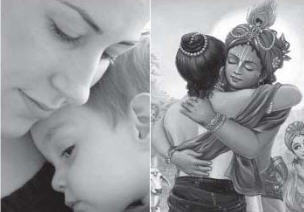Real happiness is close to us;
we only need to search in the right direction.

When I was in Standard V, we had a story in our Hindi textbook called “Mamaji Ki Ainak.” Ainak means “glasses,” and mamaji means “maternal uncle.” Once a child went to his Mamaji’s house on a vacation. Mamaji was always wearing glasses. One day Mamaji was searching for his glasses everywhere in the house. Where did he leave his glasses? He was looking for them on his table, his drawer, in his kitchen, frantically searching everywhere thinking he had lost them. Finally, his nephew came running to him and said, “Mamaji, Mamaji! Your glasses are on your head.” This uncle had put the glasses on his head and was looking for them everywhere. It required his nephew to come and tell him, “Here they are.” This is an accurate example of trying to search for something that is right within us. Similarly, happiness lies with the soul, within us, but we are looking for it elsewhere.
THE FOCUS OF ILLUSION
The Srimad Bhagavatam (7.13.29) gives the example of a deer running in a desert looking for water. Pure water is lying under the green grass, but the foolish dear is unable to locate it. The modern man faces a similar predicament. Although real happiness lies within, he is busy searching for it outside. If you ask him how to become happy, he says, “Eat good food in a five star restaurant, watch movies, and go to America for a vacation.” But despite doing all this, he remains an unhappy nervous wretch.
Massachusetts Institute of Technology and Harvard University, two of the top universities in the US, did a survey that showed how an increase in the economic facilities did not result in a proportionate increase in happiness. They called this “the focus of illusion.” Though people have so many things to enjoy, they are unhappy. They think, “If happiness is not here, we will find it somewhere else.” The focus seems to be on illusory happiness.
In a lecture, Badrinarayana Prabhu, a senior disciple of Srila Prabhupada, recalled one of his childhood incidents: “Once I went to watch a movie, and during the interval, I came out to purchase some snacks. I was looking for something big to eat a big candy bar at the cheapest price. Like a greedy child, I observed all candy bars displayed on the window and chose the largest pack. With great anticipation, I opened it and found a tray covered with a big cardboard. Inside the cardboard lay a minuscule candy.”
MATERIAL HAPPINESS
That’s what material happiness is all about. People run after happiness and are enamored by the packaging that Maya Devi offers. But ultimately they are disappointed when all they find is a “little candy bar” of insignificant happiness. A popular Hindi saying says, khoda pahad, nikli chuhi: “After digging a mountain, all you got is a little mouse.” The advertisement industry works in a similar fashion. In New York, Caribbean advertisements tell you, “Are you going nuts in the city because of traffic sounds and a busy life? Go to the Caribbean for a vacation.” But after traveling 3000 miles long, along the Caribbean coast, one finds huge advertisements urging people to go to New York, a place of life, music, action, and excitement. Material nature thus makes a fool of everyone by giving us false promises.
Badrinarayana Prabhu also shared the story of his father, who was a businessman in America. His father wished to have a nice house, where he could relax and enjoy. Working hard and earning a lot of money, he built a huge mansion on the beach. From the beautiful window of the house, sitting on a rocking chair, he enjoyed the sight of the ocean. But to maintain such an edifice, he had to continue working. He used to drive 3-4 hours to Los Angeles every day, working hard and coming back. Then he decided, “Instead of spending so much time commuting, I will stay in Los Angeles and visit my house on weekends.” So every weekend, he would come, sit on his rocking chair and enjoy the sight of the beach. And for the rest of the week, a dog sat on the chair, enjoying the ocean view.
REAL HAPPINESS

Happiness is the characteristic of the soul, which is different from the body. The soul is a part and parcel of Krishna, and its nature is ananda, bliss. Happiness does not lie in the interaction of the objects with the senses. It lies in realizing the soul, and that will lead us to real happiness. The Bhagavata dharma teaches us that the soul can only be happy when it connects to Krishna, the Supreme Soul. Therefore, in Bhagavad gita, Krishna, after imparting the preliminary knowledge of the soul, teaches Arjuna how to connect oneself to Him. Only by the process of yoga, the soul can connect to Supersoul and thus realize its eternal joyful nature. Srila Prabhupada gives the example of a small child crying for his mother. Many women try to pacify the child some give him candy, some sing songs for him, but the child is not happy. When his mother takes him on her lap, however, he immediately stops crying. Similarly, Srila Prabhupada explains that until the soul connects itself to its original mother and father, Lord Krishna, it can never be satisfied.
We also need help from great sages like Srila Prabhupada who tell us, “Go to the vast reservoir of Vedic literatures like Bhagavad gita to search for happiness.” When we follow these instructions and apply them in our lives, we will achieve real happiness.
Adapted from a lecture given by Gaura Gopala Dasa at ISKCON Mumbai. He has a degree in Electrical Engineering. He joined ISKCON in 1996 and currently serves full time in ISKCON Mumbai as a youth mentor.
